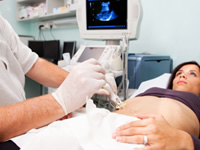This is Interesting :
Home
Body
The Liver and Blood Glucose Levels
The liver produces, stores and release glucose
Glucose is the key source of energy for the human body. Supply of this vital nutrient is carried through the bloodstream to many of the body’s cells.
The liver produces, stores and releases glucose depending on the body’s need for glucose, a monosaccharide.
This is primarily indicated by the hormones insulin - the main regulator of sugar in the blood - and glucagon.
In fact, the liver acts as the body’s glucose reservoir and helps to keep your circulating blood sugar levels and other body fuels steady and constant.
How the liver regulates blood glucose
During absorption and digestion, the
carbohydrates in the food you eat are reduced to their simplest form, glucose.
Excess glucose is then removed from the blood, with the majority of it being converted into glycogen, the storage form of glucose, by the liver’s hepatic cells via a process called glycogenesis.
Glycogenolysis
When blood glucose concentration declines, the liver initiates
glycogenolysis.
The hepatic cells reconvert their glycogen stores into glucose, and continually release them into the blood until levels approach normal range.
However, when
blood glucose levels fall during a long fast, the body’s glycogen stores dwindle and additional sources of blood sugar are required. To help make up this shortfall, the liver, along with the kidneys, uses amino acids, lactic acid and glycerol to produce glucose.
This process is known as gluconeogenesis.
The liver may also convert other sugars such as sucrose, fructose, and galactose into glucose if your body’s glucose needs not being met by your diet.
Ketones
Ketones are alternative fuels that are produced by the liver from fats when sugar is in short supply.
When your body’s glycogen storage runs low, the body starts conserving the sugar supplies for the organs that always require sugar, including the brain, red blood cells and parts of the kidney. To supplement the limited sugar supply, the liver makes ketones in a process called
ketogenesis.
Ketones are burned as fuel by muscle and other organs in the body, and the sugar is saved for the organs that need it.
Like glucose, the production of ketones in the liver is controlled by the hormone glucagon.
I had my first big hypo when I came home from having my baby, I woke up in the night to paramedics in the room. Now, if I was on my own, would my liver have eventually kicked in, at some point and brought me round.
I think most Type 1's will have a slightly different reaction to getting out of a hypo ( unassisted), depending on how low it goes, the person's overall health, any build up of Insulin already in body, maybe different foods eaten that day, or even the day before, I know my levels can be affected in this way.
Type 1 diabetes - predictably unpredictable.
A good question
@zbluebirdz. and have you gained any information from member's posts ?


